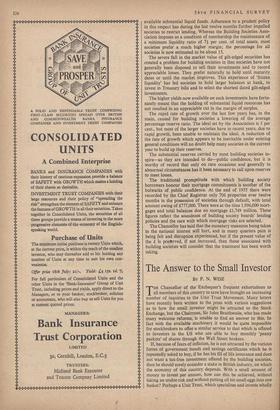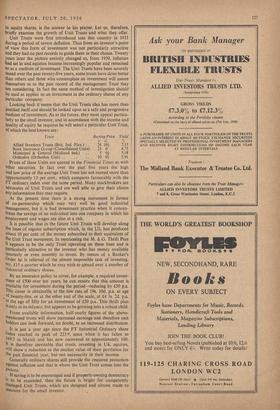The Answer to the Small Investor
BY P. N. WISE THE Chancellor of the Exchequer's frequent exhortations to all members of this country to save have brought an increasing number of inquiries to the Unit Trust Movement. Many letters have recently been written to the press with various suggestions as to how the small investor might be attracted to the Stock Exchange, but the Chairman, Sir John Braithwaite, who has made many welcome reforms, is unable to find an answer to this. In fact with the available machinery it would be quite impossible for stockbrokers to offer a similar service to that which is offered to investors in the US who are able to buy monthly 'penny packets' of shares through the Wall Street brokers.
If, because of fears of inflation, he is not attracted by the various forms of government bonds and savings certificates which he is repeatedly asked to buy, if he has his fill of life insurance and does not want a tax-free investment offered by the building societies, then he should surely consider a stake in British industry, on which the economy of this country depends. With a small amount of money to invest per annum, how can this be achieved, without taking an undue risk and without putting all his small eggs into one basket? Perhaps a Unit Trust, which specialises and invests wholly briefly examine the growth of Unit Trusts and what they offer. Unit Trusts were first introduced into this country in 1931 during a period of severe deflation. Thus from an investor's point of view this form of investment was not particularly attractive and they had no past records to guide them in their choice. Twenty Years later the picture entirely changed as, from 1950, inflation had set in and equities became increasingly popular and remained SO as a medium of investment. The Unit Trusts have been severely tested over the past twenty-five years, some trusts have done better than others and those who contemplate an investment will assure themselves as to the past record of the management Trust they are considering. In fact the same method of investigation should be used as applies to an investment in the ordinary shares of any Particular company. n equity shares, is the answer to his prayer. Let us, therefore, justified itself and should be looked upon as a safe and progressive medium of investment. As to the future, they must appeal particu- larly to the small investor, and in accordance with the income and quality of equity he requires he.will select a particular Unit Trust, Of which the best known are: Trust Buying Price s. d. Yield Allied Investors Trusts (Brit. Ind. Flex.) .. 26 101 7.15 Bank Insurance Group (Consolidated Units) 21 0 4.75 Municipal & General (Midland Ind.) .. 5 0-1- 5.18 Orthodox (Orthodox Unit) .. 10 01. 5.91 Prices of these Units are quoted in the Financial Times as with Other securities. In fact over the past five years the high and low price of the average Unit Trust has not moved more than approximately 13 per cent., which compares favourably with the FT ordinary index over the same period. Many stockbrokers are advocates of Unit Trusts and are well able to give their clients any information they may require.
At the present time there is a strong movement in favour of co-partnership which may very well be good industrial Management, but it is bad investment practice when it concen- trates the savings of an individual into one company in which his employment and wages are also at a risk. Looking back it seems that the Unit Trusts idea has more than



















































 Previous page
Previous page